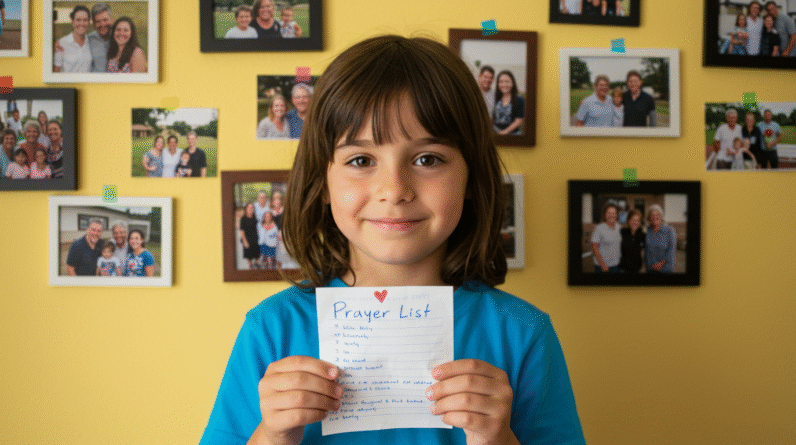Raising Faith-Filled Kids: 10 Biblical Parenting Principles
Parenting is one of life’s most rewarding yet challenging journeys, especially when your goal is to nurture faith-filled children. Think of it like planting a seed and watching it grow, lovingly tending to it with care, patience, and — most importantly — grounding it in faith. If you hope to instill your religious beliefs and values in your children but are feeling unsure about how to do it effectively, you’re in the right place. We’re going to explore the art of raising faith-filled kids by diving deep into 10 biblical principles. These principles not only offer spiritual guidance but also practical steps that you can implement easily into your daily life.
1. Love Unconditionally
Children need to feel loved, no matter what. In 1 Corinthians 13:4-7, love is described as patient and kind, not envious, boastful, or proud. It’s this variety of love that should form the backbone of your parenting approach. Set a model of love that your children can depend on, even if they sometimes stray from the beaten path.
Practical Application: Show love in both grand gestures and small acts. Speak kindly, hug more, and praise them for their efforts and achievements. Make sure your child knows that your love does not waver, regardless of their actions or mistakes. Unconditional love can be transformative, guiding them back even if they momentarily part ways from the path.
2. Lead by Example
Your actions often speak louder than your words. As James 1:22-25 advises, be doers of the Word, not merely hearers. Your children are watching you. They absorb not just your words but also your actions. They need to see you living out your faith so they can understand it on a practical level.
Practical Application: Attend church services, participate in community outreach programs, or host Bible study sessions. Make your faith visible and engaging for your children to observe and, eventually, emulate. Demonstrate how you navigate life’s ups and downs, grounded in your faith.
3. Teach Through Stories
The Bible is full of compelling stories that captivate the imagination and hold profound lessons. As Deuteronomy 6:6-7 explains, telling stories is a wonderful way to instill values. Stories leave room for imagination and interpretation, creating a convenient platform for meaningful discussions.
Practical Application: Allocate time for Bible storytelling sessions. Make it engaging by using dramatic voices, props, or even putting on a mini-play. Afterward, talk to your children about what the story might mean for them in their lives today. It helps solidify the lessons while making the process enjoyable.
4. Establish a Prayer Routine
Prayer is the lifeline of faith. Philippians 4:6 emphasizes the importance of prayer in every aspect of life. Establishing a regular prayer routine teaches your children the habit of turning to God for guidance, comfort, and gratitude.
Practical Application: Integrate prayer into your daily routine—first thing in the morning, before meals, or as a bedtime ritual. Keep it simple for younger children and progressively introduce more complexity as they grow. Encourage them to pray out loud to get them comfortable with expressing their thoughts and feelings to God.
5. Encourage Forgiveness
Forgiveness is fundamental in Christian teachings. According to Matthew 6:14-15, forgiving others is a prerequisite for being forgiven. Teaching your children the power of forgiveness is crucial for spiritual growth and emotional health.
Practical Application: Create a “forgiveness” jar at home where family members can write and place notes asking for or granting forgiveness. Discuss after dinner, reviewing the notes collectively, and celebrate compassion and understanding. This acts as a concrete reminder of the power of forgiving and being forgiven.

6. Value and Respect Diversity
The story of the Good Samaritan in Luke 10:25-37 teaches us to respect and accept people from all walks of life. Creating an understanding, compassionate, and nonjudgmental world for your children is paramount.
Practical Application: Engage in different cultural experiences, try diverse cuisines, or read books from various parts of the world with your children. Discuss what you learn and apply the lessons to your lives. This enriches their understanding and appreciation of diversity as God’s creative tapestry.
7. Highlight the Importance of Community
Community plays a vital role in biblical teaching, as stated in Hebrews 10:24-25. A strong community can provide support, reinforce values, and offer a platform for collective worship.
Practical Application: Involve yourself and your family in church or community activities. Attend potlucks, volunteer days, or charity events. This strengthens communal bonds and helps your children to appreciate the warmth and security a faith-based community provides.
8. Instill a Sense of Purpose
Ecclesiastes 12:13 reminds us that fearing God and following His commandments provide life’s ultimate purpose. Giving your children a sense of purpose grounds them in something larger than themselves.
Practical Application: Encourage your children to explore their passions through a faith-oriented lens. If they enjoy art, have them create faith-inspired artwork. If they like writing, let them author short stories with biblical morals. This helps them understand how their skills and passions can serve a larger, divine purpose.
9. Foster a Grateful Heart
Gratitude is a recurring theme, as seen in 1 Thessalonians 5:18, where it links a thankful heart to a God-centered life. Developing gratitude in your children encourages them to acknowledge and appreciate blessings.
Practical Application: Create a gratitude jar or journal at home where each family member can write down things they’re thankful for. Go through the jar or journal weekly to remind yourselves of the abundance of blessings in your lives. This cultivates a heart full of gratitude, despite challenges.
10. Practice Perseverance
Galatians 6:9 tells us not to grow weary of doing good because, in due season, we’ll reap if we don’t give up. For children, this might mean persevering in schoolwork, friendships, or when learning new skills.
Practical Application: Encourage them to set realistic goals and celebrate small victories along the way. Share stories from the Bible where perseverance paid off, and apply these lessons to the challenges your family faces today. This helps them build resilience and understand the value of persistence.
Raising faith-filled kids is not about forcing religious practices or beliefs upon them. Instead, it’s about guiding them through a life of faith by living authentically, creating an environment of love, sharing the wonders of the word, and providing a sturdy framework for them to grow. Parenting with these biblical principles helps to ensure that you’ll raise not just successful kids, but spiritually fulfilled ones.
Explore More
For further reading and encouragement, check out these posts:
👉 7 Bible Verses About Faith in Hard Times
👉 Job’s Faith: What We Can Learn From His Trials
👉 How To Trust God When Everything Falls Apart
👉 Why God Allows Suffering – A Biblical Perspective
👉 Faith Over Fear: How To Stand Strong In Uncertain Seasons
👉 How To Encourage Someone Struggling With Their Faith
👉 5 Prayers for Strength When You’re Feeling Weak

📘 Jesus and the Woman Caught in Adultery – Grace and Mercy Over Judgement
A powerful retelling of John 8:1-11. This book brings to life the depth of forgiveness, mercy, and God’s unwavering love.
👉 Check it now on Amazon
As a ClickBank Affiliate, I earn from qualifying purchases.
Acknowledgment: All Bible verses referenced in this article were accessed via Bible Gateway (or Bible Hub).
“Want to explore more? Check out our latest post on Why Jesus? and discover the life-changing truth of the Gospel!”








